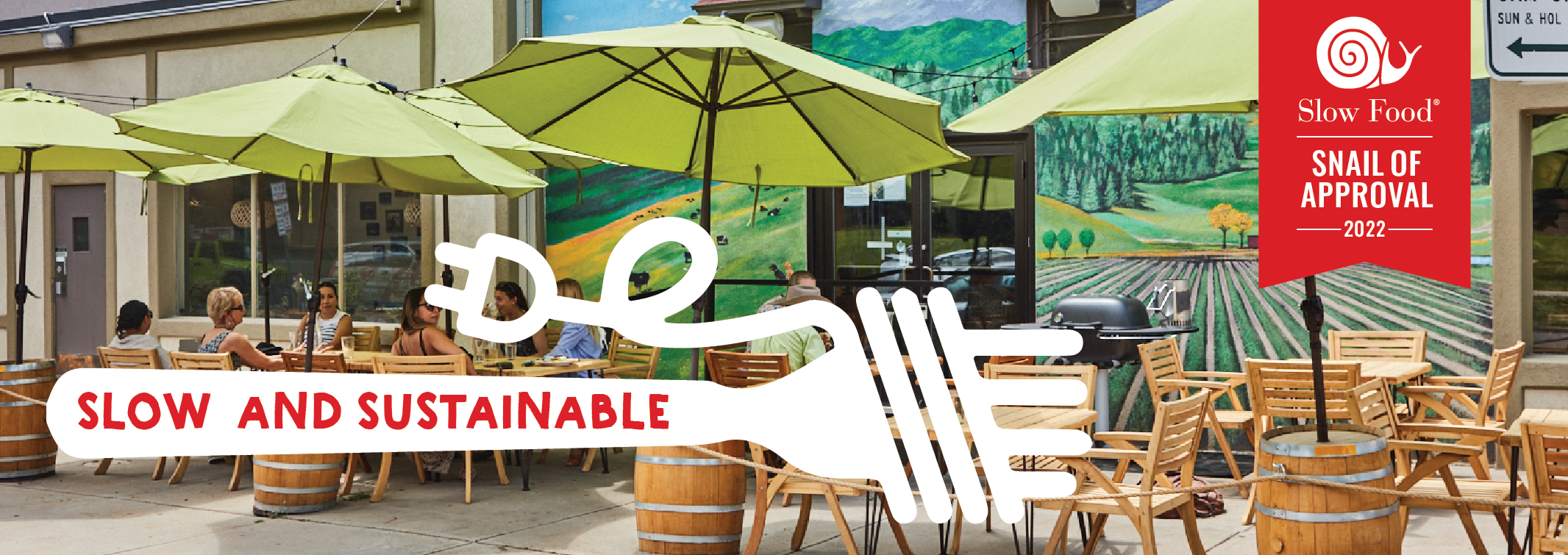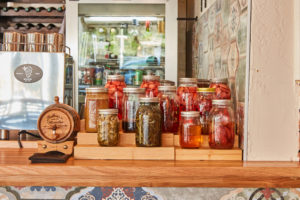By BRIAN SOLEM, SLOW FOOD USA DIRECTOR OF COMMUNICATIONS
PHOTOS BY Holly Adinoff, Bjorn Larroque and Justin Walker

 This story is part one of our Slow and Sustainable series, which profiles food businesses who are leaning into the “clean” of Slow Food’s ethos of good, clean and fair food for all. They are all winners of the Snail of Approval, a national award given to businesses embracing the environment, community, employees, and people-centered values.
This story is part one of our Slow and Sustainable series, which profiles food businesses who are leaning into the “clean” of Slow Food’s ethos of good, clean and fair food for all. They are all winners of the Snail of Approval, a national award given to businesses embracing the environment, community, employees, and people-centered values.
Under the heat of summer sun, tomatoes are bursting across North America. You may be enjoying a juicy, refreshing tomato sandwich while reading this story, even. But what do you do with tomato cores? It may be instinctive to toss them in your compost bin or garbage can. But what if that tomato core could have a new life of its own?
One restaurant is exploring the ways that kitchen scraps can be reinvented, reinvigorated, and regenerative to the menu: in Denver, Sullivan Scrap Kitchen’s owner and chef, Terence Rogers, and co-owner, general manager and wife, Holly Adinoff, are upcycling odds and ends to create flavorful and environmentally conscious creations for 600 guests every week.
 Sullivan Scrap Kitchen is only the latest venture for veterans Terence and Holly, who have each made strides in both culinary and nonprofit realms. Terence started TBD Foods, a farm-to-table catering company, in 2014; the experience of producing massive meals for groups of people taught him a thing or two about the inevitability of food waste: a brunch party with gallons of orange juice left over, for example.
Sullivan Scrap Kitchen is only the latest venture for veterans Terence and Holly, who have each made strides in both culinary and nonprofit realms. Terence started TBD Foods, a farm-to-table catering company, in 2014; the experience of producing massive meals for groups of people taught him a thing or two about the inevitability of food waste: a brunch party with gallons of orange juice left over, for example.
Those experiences led them to build Sullivan Scrap Kitchen, a community-centric, food waste-upcycling restaurant in Denver’s City Park West neighborhood that opened in the summer of 2020. This space and structure allows Terence and Holly to convert waste into new opportunities.
“Sometimes we had extra things [at catered events through TBD Foods], like at seafood boils we had extra lobster tails,” recalled Terence. “Now we have another avenue to sell those tails. We donate a lot of things, give food to staff, but now there’s another avenue: a lobster special at the restaurant.”
The effort to savor scraps extends across the entire food and beverage program at Sullivan Scrap Kitchen. Less-edible things like asparagus ends, beet peels and onion scraps lend their flavors to vegetable stock. Papery ginger peels become a spicy simple syrup. Leftover herbs are muddled in cocktails. An abundance of egg whites become Swiss meringues and pavlovas, or an exceptional egg white aioli. Sourdough discard goes into their pancake mix or other baked goods. There’s something almost regenerative about how many lives Terence and Holly are able to cull from a simple beet.
 “There’s a certain coolness about being a whole animal butchery,” observed Terence. “It’s trendy. But being a whole-vegetable kitchen just doesn’t sound as badass. We make sustainable food and hit our marks on food and beverage prices. If we didn’t practice this, our prices would have to be much higher.”
“There’s a certain coolness about being a whole animal butchery,” observed Terence. “It’s trendy. But being a whole-vegetable kitchen just doesn’t sound as badass. We make sustainable food and hit our marks on food and beverage prices. If we didn’t practice this, our prices would have to be much higher.”
What does sustainability mean to Terence and Holly? “It’s become a buzzword, a catch-all,” reflected Terence.” It’s a marketing word. When we talk about sustainability, we’re talking about how we source it and treat it, our staff not being overworked and paid living wage. We want our staff to look forward to coming in to work.”
“It’s also about intentionality,” chimed in Holly. “Why are we doing this? Does it fit into our mission?”
That intentionality is a vein that runs through Sullivan Scrap Kitchen’s decisions around sourcing the food in their restaurant. Their chickens aren’t necessarily raised in their backyard, but they’re from a sustainable poultry farm. They choose seafood that’s not overfished, like mussels.
It also runs through how they connect to the community. Their goal from day one was to make sure that their food was accessible, cost-wise, particularly since they opened their doors in a socioeconomically diverse neighborhood. That’s why they choose to maintain some fan favorites like their burger special, that strike the balance between affordable and just plain awesome to eat.
 “Protein sourcing is tough,” said Terence. “We debated a lot around how we feed our community. Our burger is one of the best selling items on the menu, but proteins are the worst items for the environment.” To balance environmental impact and cost and flavor desires, Sullivan Scrap Kitchen mostly sources whole animals and breaks them down one at a time, rather than buying individual cuts of meat.
“Protein sourcing is tough,” said Terence. “We debated a lot around how we feed our community. Our burger is one of the best selling items on the menu, but proteins are the worst items for the environment.” To balance environmental impact and cost and flavor desires, Sullivan Scrap Kitchen mostly sources whole animals and breaks them down one at a time, rather than buying individual cuts of meat.
Sullivan Scrap Kitchen has been recognized by national media and received a number of awards, including Slow Food USA’s Snail of Approval award, bestowed upon Terence and Holly by the Slow Food Denver chapter.
“We want to support the Slow Food movement here in Denver; it’s a great direction the restaurant industry should be going toward in general,” said Terence. “We want to show how it’s approachable and try to encourage others to follow suit and try to receive the Snail of Approval award. Together, we can create a more sustainable culture.”

